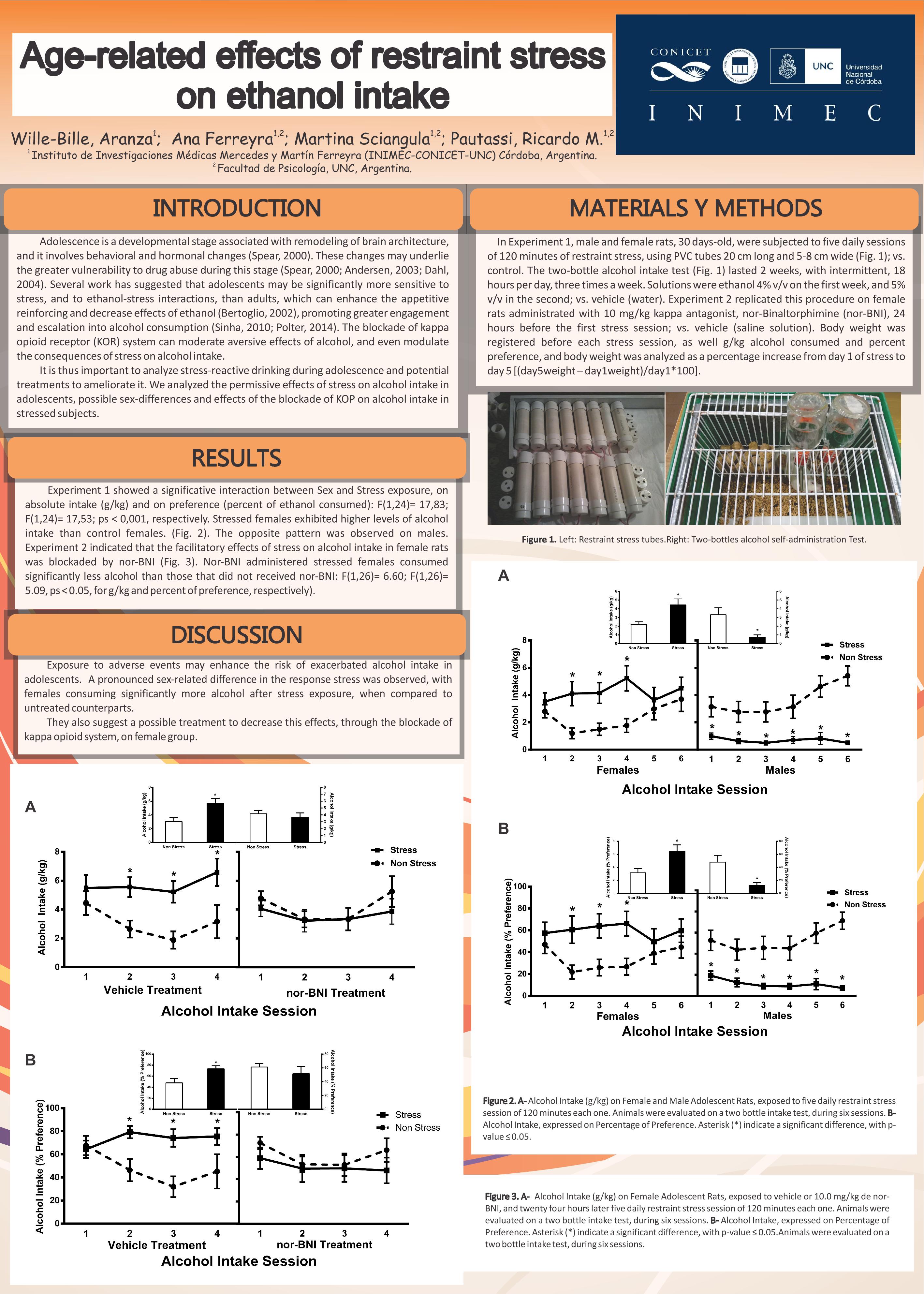Mostrar el registro sencillo del ítem
dc.contributor.author
Wille-bille, Aranza

dc.contributor.author
Ferreyra, Ana Ines

dc.contributor.author
Sciangula, Martina
dc.contributor.author
Pautassi, Ricardo Marcos

dc.date.available
2018-11-11T15:44:11Z
dc.date.issued
2017-05-04
dc.identifier.citation
Wille-bille, Aranza; Ferreyra, Ana Ines; Sciangula, Martina; Pautassi, Ricardo Marcos; Age-related effects of restraint stress on ethanol intake; Elsevier Science Inc; Alcohol; 60; 4-5-2017; 229
dc.identifier.issn
0741-8329
dc.identifier.uri
http://hdl.handle.net/11336/64200
dc.description.abstract
Several work has suggested that adolescents may be significantly more sensitive to stress, and to ethanol-stress interactions, than adults. It is thus important to analyze stress-reactive drinking during adolescence and potential treatments to ameliorate it. Stress effects upon ethanol intake in animal rat models have been controversial, with studies indicating heightened, decreased or unaltered ethanol intake after stress. The present study analyzed the impact of chronic restraint stress (5 daily, 2h long, sessions) upon ethanol intake, assessed across two-weeks via intermittent, 18-h two bottle intake tests, in male and female adolescent and adult rats. We found greater ethanol intake and preference in stressed than in non-stressed female, but not in male, adolescent rats. This effect of stress was inhibited after blockade of kappa opioid receptors by norbinaltorphimine (10 mg/kg). Significant age-related differences were observed, with stressed-adult females drinking actually less than their same-age controls. In subsequent experiments we observed that adolescent stressed females exhibited signs of behavioral disinhibition when tested in a modified version of the concentric square field test. Altogether, these results confirm the hypothesis of greater adolescent reactivity to stress, which can result in increased liability for ethanol intake, particularly among females. Treatments that tackle the endogenous opioid system, in particular the kappa receptors, seem to hold promise as a therapeutic target to reduce this stress-mediated ethanol drinking.
dc.format
application/pdf
dc.language.iso
eng
dc.publisher
Elsevier Science Inc

dc.rights
info:eu-repo/semantics/openAccess
dc.rights.uri
https://creativecommons.org/licenses/by-nc-sa/2.5/ar/
dc.subject
Stress
dc.subject
Alcohol
dc.subject
Adolescents
dc.subject
Adults
dc.subject.classification
Salud Ocupacional

dc.subject.classification
Ciencias de la Salud

dc.subject.classification
CIENCIAS MÉDICAS Y DE LA SALUD

dc.title
Age-related effects of restraint stress on ethanol intake
dc.type
info:eu-repo/semantics/article
dc.type
info:ar-repo/semantics/artículo
dc.type
info:eu-repo/semantics/publishedVersion
dc.date.updated
2018-10-22T15:50:48Z
dc.identifier.eissn
1873-6823
dc.journal.volume
60
dc.journal.pagination
229
dc.journal.pais
Estados Unidos

dc.journal.ciudad
Nueva York
dc.description.fil
Fil: Wille-bille, Aranza. Consejo Nacional de Investigaciones Científicas y Técnicas. Centro Científico Tecnológico Conicet - Córdoba. Instituto de Investigación Médica Mercedes y Martín Ferreyra. Universidad Nacional de Córdoba. Instituto de Investigación Médica Mercedes y Martín Ferreyra; Argentina
dc.description.fil
Fil: Ferreyra, Ana Ines. Consejo Nacional de Investigaciones Científicas y Técnicas. Centro Científico Tecnológico Conicet - Córdoba. Instituto de Investigación Médica Mercedes y Martín Ferreyra. Universidad Nacional de Córdoba. Instituto de Investigación Médica Mercedes y Martín Ferreyra; Argentina
dc.description.fil
Fil: Sciangula, Martina. Consejo Nacional de Investigaciones Científicas y Técnicas. Centro Científico Tecnológico Conicet - Córdoba. Instituto de Investigación Médica Mercedes y Martín Ferreyra. Universidad Nacional de Córdoba. Instituto de Investigación Médica Mercedes y Martín Ferreyra; Argentina
dc.description.fil
Fil: Pautassi, Ricardo Marcos. Consejo Nacional de Investigaciones Científicas y Técnicas. Centro Científico Tecnológico Conicet - Córdoba. Instituto de Investigación Médica Mercedes y Martín Ferreyra. Universidad Nacional de Córdoba. Instituto de Investigación Médica Mercedes y Martín Ferreyra; Argentina
dc.journal.title
Alcohol

dc.relation.alternativeid
info:eu-repo/semantics/altIdentifier/doi/https://dx.doi.org/10.1016/j.alcohol.2017.02.293
dc.relation.alternativeid
info:eu-repo/semantics/altIdentifier/url/https://www.sciencedirect.com/science/article/pii/S0741832917306328?via%3Dihub
Archivos asociados
